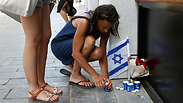
Paying respect near Sarona Market following the terror attack
צילום: רויטרס
Sarona is not Kiryat Arba
While terror attacks that happen in Tel Aviv are just considered a part of life in Israel, terror attacks in settlements beyond the Green Line confer special privileges upon those who live in the area. Why is this the case?
The state of Israel has two contingency plans in case of terror attacks. If the attack happens in Tel Aviv, you go on as usual. Tel Avivians are praised for all the traits they are usually scorned for having: their tendencies to have fun, buy, sell and generally keep their cool. Two days later, the attack is erased from everyone’s memories, and Tel Aviv goes back, in everyone’s minds, to being a non-stop city that never experiences terrorism and whose spoiled residents live in a bubble.
![]()
Nava Ney recently posted on social media that as compensation for the murders at Tel Aviv’s Sarona Market, Prime Minister Benjamin Netanyahu should increase the number of planned construction projects aimed at young couples inside the Green Line area, raise the welfare budget, lower school class sizes to a maximum of 20 pupils, give all children in Israel free education up until they finish their PhDs, take out fascist content from school curricula and increase the number of medicines that receive government subsidization.
Any sensible person knows this is a fantasy. Ney herself knows that none of her demands will be met. Even the act of connecting the terror attack to some demand by the families or the city's residents is absurd.
Terrorist attacks are a part of our lives. Attacks in Tel Aviv don’t grant the city’s residents any privileges. The housing and education policy (or, in our case, the lack thereof) is a matter for policy makers. But when the attack happens beyond the faded Green Line, things are completely different. The attack is then seen as an expression of unending hatred of the People and Land of Israel (of course, the true Land of Israel is only beyond the Green Line, and only those who reside there are fit to be called the People of Israel).
Therefore, a cosmic-scale response is needed – regardless of state concerns about what will be gained or lost. The bereaved families and the Yesha Council get to run Israel’s foreign and defense policy for a few days. Life cannot simply go on. You need to build new roads, demolish homes, remove the terrorists’ families, whether they had anything to do with the attack or not, and above all you must add to the Jewish presence in the West Bank by expropriating lands, disinheriting the locals and removing Palestinians, all in the name of the blood that has been spilled.
Because while the Tel Avivian blood stays silent, the settlement blood screams. And it always shouts the same message: Fulfil the settler agenda, regardless of the price everyone else is to pay. We must strengthen the settlement project – now! That project is, in the name of the spilled blood, placed above any other consideration. Security, state, economic, proper administration, and common sense considerations are all left by the wayside. The question of why there’s even a need for a Jewish presence in Hebron, and whether there’s any sense in increasing its population numbers now, is seen as sacrilege. It doesn’t take much to get the asker accused of having “blood on their hands,” as Facebook founder Mark Zuckerberg can well attest.
Something about this skewed perception also pops up when discussing the topic of returning the bodies of IDF soldiers. If you ask most IDF commanders, they’d say there’s no logic in risking living people for the sake of bringing bodies “back home.” If the other side demands the release of terrorists in return for the Israeli bodies (or body parts) in its hold, the only logical answer is to completely refuse – especially if these terrorists have blood on their hands and are likely to spill more if they are released.
That’s not how things work in Israel. The dead and their spokespeople are given the right to determine policy for the living. The suffering the families go though is worthy of empaty, and their will to bring the bodies of fallen soldiers to a proper burial is understandable. The question is the price that must be paid. Is it appropriate to give the families veto power over agreements that serve Israeli interests? Should it be permissible to exchange living terrorists for dead bodies? The families are not the right target for these inquiries.
The decider’s difficult role is to put the general welfare above all other considerations. If you need to build in Hebron, it shouldn’t have anything to do with a terror attack. If the State of Israel has an interest in weakening Hamas, its demands should not be capitulated to please bereaved families.










